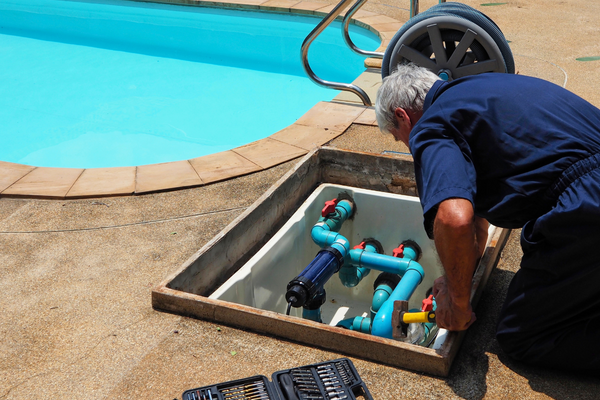The key to a happy life as a pool owner is to carefully maintain it all year long. The better you maintain your swimming pool, the more mileage you’ll be able to get out of it. Unfortunately, many pool owners tend to make the same mistakes over and over again, resulting in avoidable frustration. Next time you’re looking to do some routine pool maintenance, here are five of the most common swimming pool maintenance mistakes to avoid making.
Infrequent testing of pool water
The first mistake is one of the most common – failing to set and follow a strict pool water testing schedule. Testing your pool water is crucial to maintaining healthy water, and should be done on a weekly basis at minimum. Every time you’re out cleaning your pool or performing any other piece of routine maintenance, you should also be testing the water. Testing is made easy by liquid kits and test strips, requiring no more than just a few minutes of your time to ensure that your water has appropriate pH levels, alkalinity and chlorine. For a more in-depth test, a sample of your pool water should be brought to your local pool company at least a couple times per swimming season.
Not maintaining balanced pool water
Not maintaining the alkalinity and pH levels of your pool water is another all-too common mistake, one which no pool owner regularly testing their water has any excuse for. Balancing the pH levels in your pool will ensure that the water is neither too acidic or alkaline, ensuring that algae will not thrive and pool equipment will continue to operate without sustaining damage. Maintaining perfectly balanced pool water means being able to enjoy your pool throughout the entire summer, and extending the life of crucial pool equipment and accessories. Water is easily maintained with the help of regular testing and things like alkalinity or pH increasers.
Failing to winterize your pool properly
Winterizing your pool means more than simply shutting it down for the season and adding a cover to it – proper winterization means balancing the water with winterizing chemicals to ensure that the water is not infested with algae. When closing down your pool for the winter season, be sure to add algaecide to the water to ensure that the growth of algae is stopped before it can even begin, and use a metal sequestrant to eliminate the risk of metal staining. Enzymes can also be used when winterizing to ensure that staining does not occur.
Backwashing: don’t do it too often
Backwashing reverses the flow of water in your pool to keep your filter running efficiently. The biggest mistake we see in the backwashing area is pool owners doing it too often.
Cartridge filter
How often is too often? It depends on the PSI reading on your filter, and shouldn’t be done at regular intervals. If the PSI level on your filter is significantly higher than usual, it’s time for a backwash. If, for example, your filter is running well at 15 PSI and you notice it’s at 20 PSI, it’s time for a backwash.
Sand filter
A sand filter should be backwashed once a month, but not if there is algae or significant dirt buildup in the pool. If that is the case, clear this debris prior to backwashing. Your filter isn’t a garburator, and a sand filter is particularly sensitive to clogging if large debris gets into it.
Adding pool shock directly to your pool water
Shocking your pool is an important part of keeping healthy pool water, but many pool owners do so improperly and learn the hard way about proper pool shock etiquette. Adding shock directly to your pool water is a great way to destroy that vinyl pool liner you’ve invested in by greatly increasing the concentration of chlorine in the water. In order to shock your pool water properly, you should always make sure to pre-dissolve the chemicals in a separate container and add the mixture to the water once this has been done. You never want to pre mix liquid chlorine in a bucket with water as it is not safe to pour liquid to liquid with splash risk.
You’ll want to wear PPE while pre-dissolving your shock chemicals, as they can wreak havoc on your eyes and clothing if not careful. If, while shocking your pool, you find that chemicals have settled on the bottom of your pool, you can use a brush to evenly disperse it and ensure that it does its job effectively. Shocking should be done on a regular basis (preferably in the evening), and should never be done through your pool skimmer – doing so can destroy your filtration system and create noxious gas.
With the right amount of dedication and research, pool maintenance can be a breeze and even a rewarding experience. With proper maintenance, you’ll be able to enjoy your swimming pool to the fullest extent all summer long and be worry-free about your pool during the off season.
If you’re still unsure about proper pool maintenance or if you’re thinking about kicking off some exciting new pool renovations, choose UV Pools. We are a leading Winnipeg pool company specializing in swimming pool renovations, pool liner replacements and pool repairs. Our team is prepared to take on projects of all shapes and sizes so you can enjoy your summer and get to swimming. To find out more about the pool renovations, repairs and liner replacement services offered by the fine folks at UV Pools, get in touch with us today for your free quote.

